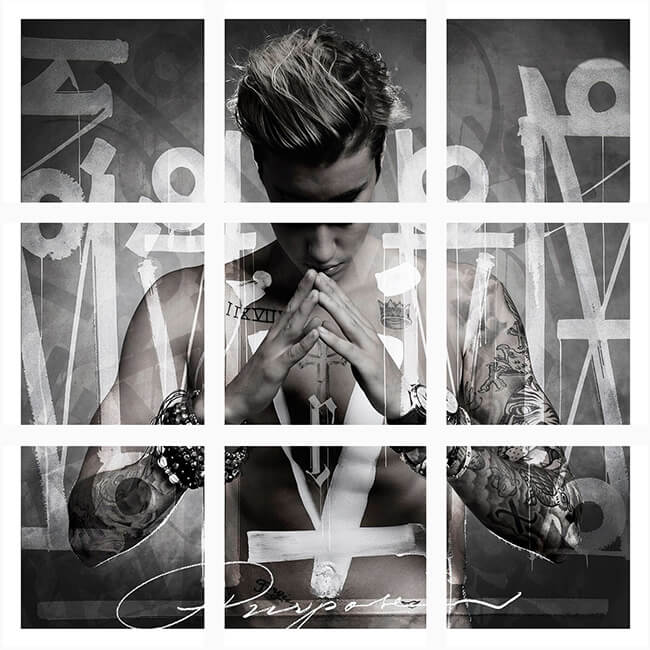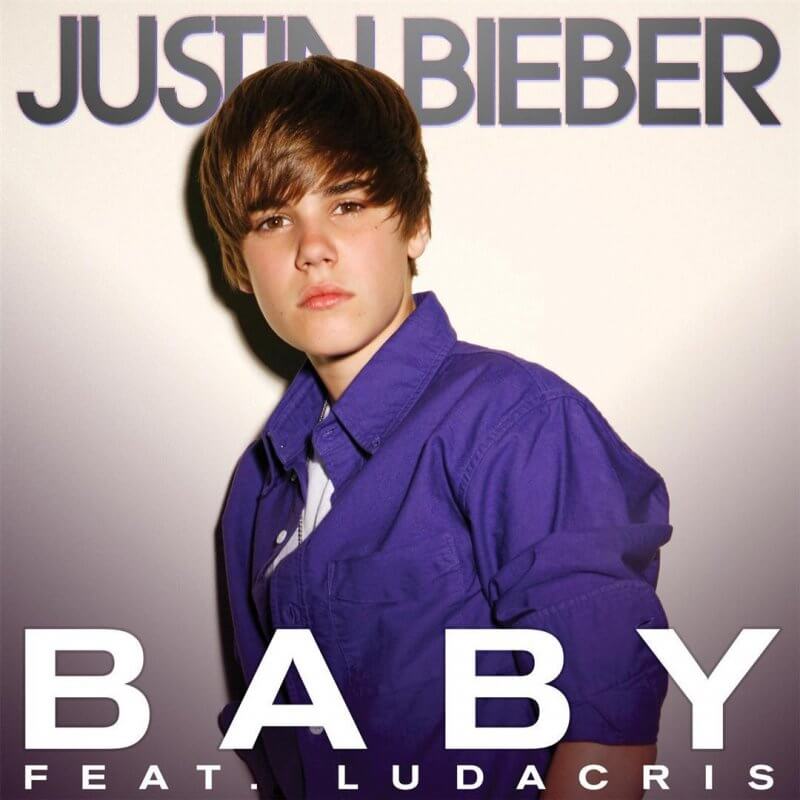Sorry, Justin Bieber’s New Album Is Shitty
I first heard about Justin Bieber from Alicia, one of my coworkers at Nordstrom who kept gushing about some new child star who was Usher’s protege. When I was in college we worked together in the BP clothing section (read: teen) of Nordstrom in Thousand Oaks, California. This was the phase of my life when I was still fully rockist—like, listening-to-The-Eagles-as-loud-as-they’d-go rockist. I drove back through the canyons home to Malibu after work that day, flipping through Joe Walsh, Tom Petty, Neil Young, thinking: As if I’d care about a teen star! He was just another new pop artist I’d smugly ignore. I liked Bob Dylan for god’s sake. I was way too deep inside my own manic-pixie-dream myth to fall for this shit. But then I saw him, up on that enormous multimedia screen in the middle of our Nordstrom section, dancing through a bowling alley, softly howling “Baby” like he knew what love was, trying not to look nervous next to Ludacris. Jesus. I thought. He looks just like Connor. It was 2010, and Justin Bieber was sixteen, two whole years younger than my baby brother.
It hardly seems like a coincidence that teenage Bieber rose to prominence on the back of a song literally titled “Baby.” Used romantically, the term “baby” is ubiquitous now, divorced from its original context. But something noxious lurks there right? As if it speaks directly to the state of a relationship, that you both identify as children, or want to, or see each other as such. But the video was sweet too, it was self-deprecating and openly emotional in a way that there’s not a lot of room for straight men in music to be right now. I was researching Enya yesterday, and stumbled upon this 2003 Mario Winans and P.Diddy collab, “I Don’t Want To Know.” The male vulnerability and lack of posturing in this song was almost shocking to me. Then again, this song speaks to adults about the real complications of relationships, not to children about the daydreams of infatuation.
Since this was Bieber’s coming-of-age album, and seemed posited on his contrition, I was hopeful this record would grapple with the complexity of adulthood, particularly in the realm of relationships. The Jack Ü stuff was so promising, “Where Are Ü Now,” “What Do You Mean,” and “Sorry” were all lightly dusted with maturity and tantalizing EDM hooks. Maybe the whole album would be just as strong. Plus, in the five years since Bieber’s breakthrough, I’d become an avowed poptimist, and despite his recent past full racist, careless, pathetic softboy fuckery, I’m a sucker for a redemption narrative.
But it just wasn’t in the cards.
Turns out Bieber’s voice is so boring it sounds best when Skrillex fiddles it into a jumpy falsetto flit or a pitch-shifted dark growl. Turns out Bieber’s voice sounds better when it’s manipulated into sounding more like a synth “dolphin” than a human. Purpose wanders aimlessly, occasionally connecting on a sonic level, but repeatedly reiterating that Bieber is more lost and confused than he’s ever been. Aside from the heavy involvement of Skrillex, there’s no clear production style or through-line of any kind. The features: A rapper who consistently needs cosigns to be relevant, a rapper/producer who boosts flailing, more-famous stars, a breathy, industry concocted glut of internet ephemera, and an iconic if mostly irrelevant rapper who needs money. I’ll leave you to parse which is which, although I listed them in the order they appear. The most important guest on Purpose is someone who looms large over the album, even if she’s not present.
The force of Selena Gomez is almost more compelling on Purpose than the force of Bieber himself. She’s the easy muse behind “Mark My Words,” “What Do You Mean,” “Sorry,” “Love Yourself,” “No Pressure,” “No Sense,” “The Feeling,” “Where Are Ü Now” — and arguably others. Sure, it’s possible that none of these songs are about the couple’s dissolution. But Bieber’s camp knows that fans are going to listen to Purpose through the Jelena framework. While Gomez is releasing candid, vulnerable ballads about their clearly-doomed relationship, he’s sunk to the negging bullshit of “Love Yourself”? I can’t fit enough eye rolls into the endless expanse of the internet to illustrate how truly toxic that song is.
It’s a self-love anthem spiked with poison and a condemnation of a woman’s appreciation of her own beauty. There’s a reason this song sounds more like John Mayer than anything Bieber has ever done before, it’s filled to the brim with the same softboy posturing that Mayer built his career on, and then used to fuck his groupies. Then the line about his mom–“My mama don’t even like you and she likes everyone”–as if invoking the unconditional love of a mother absolves men from their failure in relationships with other women? Of course your mother doesn’t like the woman you’ve had a faulty, difficult relationship with, but in no way does that devalue the woman in question. I cringe when I think of all the twelve-year-old girls who will hear this and internalize it. I cringe when I think about Selena listening to this. Maybe she’s internationally famous, but I still want to protect her from the public passive aggressive bullshit of an ex-boyfriend using an enormous platform to subtly undermine her worth.
Which boils down to my major issue with Purpose, it’s built atop the fumbling, weak variety of masculinity that seems more ubiquitous with every passing day. Masculinity is already a toxic construct used to squeeze men into a vise of tough guy posturing, emotionless sexual trysts and professional success at all costs. On Purpose, Bieber sounds confused and weary of these three components in particular, attempting rejoinder on the empty schmaltz of “Children” and “Life Is Worth Living.” Children are hurting, yes, but they hurt even more when they’ve grown years older without gaining maturity, without gaining grace. Show me where Purpose inspires, uplifts or displays courage? I can’t find anything to admire on this record. I can’t find any quiet strength, a sense of well-being or a single moment of joy. Even the drops sound sad.
“Sorry” is probably my favorite song on here, and I’m not alone, but it serves up the same careless apology that takes no responsibility for mistakes and makes no attempt to change serious underlying faults. “Sorry” isn’t an apology as much as a power play, a chance to test how much power you wield over someone. So many women I know have pinpointed this track as the embodiment of shoddy remorse, the epitome of a type of behavior from men who, given that second chance, only end up carelessly hurting them again. How far apart is humming along to the we-know-it’s-toxic “Sorry” and enabling men to continue treating us and our friends like this? Perhaps part of why we’re so drawn to the song is because this is what we’ve settled for, this is what we’re used to. There’s familiarity in disappointment.
Listening to Purpose I’m unable to shake the image of innocent Bieber and his eventual trajectory. I’m unable to divorce it from the same hardening, aggression and confusion that now inhabits my younger brother. My emotions toward Justin Bieber are almost an exact mirror of how I feel about Connor: Deep affection and disappointment, sadness. Sadness, mostly because I will always remember when he was cute and wide-eyed, completely unaware of the prison of “manhood” the world had in store for him. I feel a deep empathy for the ways masculinity warped that initial innocence, and also an anger that he is just as responsible for enacting those forces back out into the world. Even if he knows exactly what he’s doing. Even if he hates himself for it.
Self-knowledge–that is the crux of softboy politics. When doled out as an insult, softboy is less a commentary on the man himself and more a realization on the part of the woman doling it out: This is someone who can’t be strong in the ways committed, flourishing partnerships require. Look around you, men aren’t required to learn those skills. What is a man supposed to be? Harder: What kind of man are you expected to become if you’re a sixteen year-old kid who is one of the richest, most powerful and sought after figures in the known world? This becomes especially hard to balance when you’re going through a breakup with your first love, who happens to also work in the exact same industry. For me, Bieber’s album is such a letdown because he has enough self-awareness to use his power for good, and he lazily chooses not to. At a certain point, it seems like the only purpose of this album is to prove something to Selena Gomez. In preparation for his next album, maybe Bieber should try to go and love himself instead. I’m still waiting for him to figure out what that means.
You might also like 






















